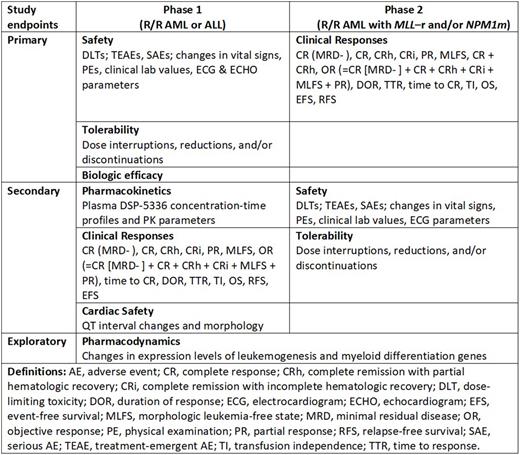Abstract
Patients who relapse after initial acute leukemia (AL) treatment have median survivals <6 mo for AML and <1 y for ALL, especially AML or ALL with MLL rearrangements (MLLr) or relapsed AML with NPM1 mutations. Translocations of the MLL gene (5% to 10% of adult patients) produce an aggressive subtype, with a median overall survival (OS) of approximately 9 months. The NPM1 mutation (NPM1m) occurs in 30-35% of adult de novo AML and is associated with favorable prognosis. However, 40-50% of these patients have concurrent FLT3-internal tandem duplication mutations negating this favorability. DSP-5336, a novel oral small-molecule, was developed to prevent menin protein binding to MLL fusion proteins that drive leukemogenesis.
Nonclinical studies of DSP-5336 showed selective growth inhibition against human AL cell lines with MLLr or NPM1m. Evidence of antitumor activity and survival advantage was demonstrated in 3 AML xenograft models with MLLr and/or NPM1m. Treatment with DSP-5336 may reduce leukemic cells and benefit patients with relapsed or refractory (R/R) MLLr or NPM1m AML or pts with R/R MLLr ALL.
An open-label, single-arm, phase 1/2 study (NCT04988555) will evaluate the safety and efficacy of DSP-5336 and determine the recommended phase 2 dose (RP2D) in adults aged ≥18 y with relapsed/refractory AML or ALL after at least one line of therapy. Key inclusion criteria are ECOG performance status 0-2 and adequate organ function. Patients will be dosed twice daily in 28-day cycles. In phase 1, 21-30 pts will be enrolled into multiple dose cohorts (1-6 pts per dose level), with dose escalation determined using a two-parameter Bayesian logistic regression model. The RP2D will be informed by the maximum biologic effect or maximum tolerated dose, whichever is lower. The phase 2 study will include two arms (relapsed or refractory [R/R] AML with MLLr and R/R AML with NPM1m). Patients will be treated at the RP2D to evaluate clinical activity and safety, monitored using Bayesian posterior probability to optimize enrollment, with Bayesian stopping rules. Bayesian monitoring of responses begins after the first 10 enrolled patients are evaluable for efficacy. This study is recruiting in the United States and Japan.
Disclosures
Daver:Agios, Celgene, SOBI and STAR Therapeutics: Consultancy, Membership on an entity's Board of Directors or advisory committees; Kartos and Jazz Pharmaceuticals: Other: Data monitoring committee member; Karyopham Therapeutics and Newave Pharmaceutical: Research Funding; Astellas, AbbVie, Genentech, Daiichi-Sankyo, Novartis, Jazz, Amgen, Servier, Karyopharm, Trovagene, Trillium, Syndax, Gilead, Pfizer, Bristol Myers Squibb, Kite, Actinium, Arog, Immunogen, Arcellx, and Shattuck: Consultancy, Other: Advisory Role; Astellas, AbbVie, Genentech, Daiichi-Sankyo, Gilead, Immunogen, Pfizer, Bristol Myers Squibb, Trovagene, Servier, Novimmune, Incyte, Hanmi, Fate, Amgen, Kite, Novartis, Astex, KAHR, Shattuck, Sobi, Glycomimetics, Trillium: Research Funding. Ikezoe:Asahi Kasei Pharma: Research Funding; Nippon Shinyaku Co., Ltd: Honoraria; Ono Pharmaceutical: Honoraria, Research Funding; Takeda Pharmaceutical: Honoraria, Research Funding; AbbVie GK: Research Funding; GlaxoSmithKline K.K.: Research Funding; Novartis Pharma: Honoraria, Research Funding; Janssen Pharmaceutical: Honoraria, Research Funding; Alexion Pharma: Honoraria, Membership on an entity's Board of Directors or advisory committees; Chugai Pharmaceutical: Honoraria; Otsuka Pharmaceutical: Honoraria; Sumitomo Pharma: Honoraria; Daiichi-Sankyo: Honoraria; Kyowa Kirin: Honoraria; Pfizer: Honoraria; Sanofi: Honoraria; BMS: Honoraria. Miyazaki:Nippon Shinyaku: Honoraria; Novartis: Honoraria; Abbvie: Honoraria; Astellas: Honoraria; Dainippon-Sumitomo Pharma: Honoraria, Research Funding; SyinBio: Honoraria; Chugai: Honoraria; Bristol-Myers: Honoraria; Kyowa-Kirin: Honoraria; Pfizer: Honoraria; Otsuka Pharmaceutical: Honoraria; Takeda: Honoraria; Daiichi-Sankyo: Honoraria; Janssen Pharmaceutical: Honoraria; Celgene: Honoraria. Erba:Celgene: Consultancy, Membership on an entity's Board of Directors or advisory committees, Speakers Bureau; Abbvie: Consultancy, Research Funding, Speakers Bureau; Agios: Consultancy, Research Funding, Speakers Bureau; Amgen: Consultancy, Research Funding; Astellas Pharma: Consultancy; Celgene: Consultancy, Other, Speakers Bureau; Daiichi Sankyo: Consultancy, Research Funding; Glycomimetics: Consultancy, Membership on an entity's Board of Directors or advisory committees, Research Funding; ImmunoGen: Consultancy, Research Funding; Incyte: Consultancy, Speakers Bureau; Jazz Pharmaceuticals: Consultancy, Research Funding, Speakers Bureau; MacroGenics: Consultancy, Research Funding; Novartis: Consultancy, Research Funding, Speakers Bureau; Covance (Abbvie): Consultancy, Other: Independent Review Committee, Research Funding; Janssen Oncology: Consultancy; Trillium Therapeutics: Consultancy; Takeda: Consultancy; Kura Oncology: Consultancy; Forma Therapeutics: Research Funding; Gilead/Forty Seven: Research Funding; PTC therapeutics: Research Funding; ALX Oncology: Research Funding; Pfizer: Consultancy. Affinito:Sumitomo pharma oncology: Current Employment. Brooks:Sumitomo Pharma Oncology, Inc.: Current Employment. Eguchi:Sumitomo Pharma Co., Ltd.: Current Employment. Cai:Sumitomo Pharma Oncology: Current Employment. Xu:Sumitomo Pharma Oncology: Current Employment. Stoudemire:Sumitomo Pharma Oncology: Consultancy. Hitron:Sumitomo Pharma Oncology: Current Employment. Watanabe:Sumitomo Pharma Oncology: Current Employment. Komarnitsky:Sumitomo Pharma Oncology: Current Employment.
Author notes
Asterisk with author names denotes non-ASH members.


This feature is available to Subscribers Only
Sign In or Create an Account Close Modal